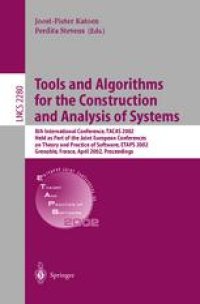
Ebook: Tools and Algorithms for the Construction and Analysis of Systems: 8th International Conference, TACAS 2002 Held as Part of the Joint European Conferences on Theory and Practice of Software, ETAPS 2002 Grenoble, France, April 8–12, 2002 Proceedings
- Tags: Logics and Meanings of Programs, Software Engineering, Computer Communication Networks, Algorithm Analysis and Problem Complexity
- Series: Lecture Notes in Computer Science 2280
- Year: 2002
- Publisher: Springer-Verlag Berlin Heidelberg
- Edition: 1
- Language: English
- pdf
ETAPS 2002 was the ?fth instance of the European Joint Conferences on Theory and Practice of Software. ETAPS is an annual federated conference that was established in 1998by combining a number of existing and new conferences. This year it comprised 5 conferences (FOSSACS, FASE, ESOP, CC, TACAS), 13 satellite workshops (ACL2, AGT, CMCS, COCV, DCC, INT, LDTA, SC, SFEDL, SLAP, SPIN, TPTS, and VISS), 8invited lectures (not including those speci?c to the satellite events), and several tutorials. The events that comprise ETAPS address various aspects of the system - velopment process, including speci?cation, design, implementation, analysis, and improvement. The languages, methodologies, and tools which support these - tivities are all well within its scope. Di?erent blends of theory and practice are represented, with an inclination towards theory with a practical motivation on one hand and soundly-based practice on the other. Many of the issues involved in software design apply to systems in general, including hardware systems, and the emphasis on software is not intended to be exclusive.
This book constitutes the refereed proceedings of the 8th International Conference on Tools and Algorithms for the Construction and Analysis of Systems, TACAS 2002, held in Grenoble, France, in April 2002.
The 29 revised full papers presented together with one invited paper and four tool papers were carefully reviewed and selected from 95 submissions. The papers are organized in topical sections on real-time and probabilistic systems, scheduling, miscellaneous, software verification, infinite-state and parametric systems, model checking: logics and algorithms, model checking and testing, partial-order and simulation techniques, and debugging with model checking.